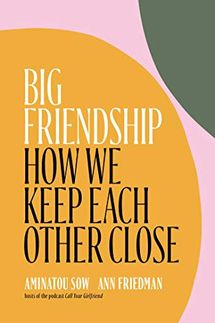Aminatou Sow and Ann Friedman’s Big Friendship: How We Keep Each Other Close begins, “Big Friendship is a bond of great strength, force, and significance that transcends life phases, geography, and emotional shifts. It is large in dimension, affecting most aspects of each person’s life. It is full of meaning and resonance. A Big Friendship is reciprocal, with both parties feeling worthy of each other and willing to give themselves in generous ways. A Big Friendship is active. Hearty. And almost always, a Big Friendship is mature. Its advanced age commands respect and predicts its ability to last far into the future.” Sow and Friedman’s compelling manifesto then goes on to explore their transformative relationship and chronicles their first decade in each other’s lives — the good, the bad, and the utterly hilarious.
In our latest Cut Chat, the authors and Call Your Girlfriend podcast co-hosts talk about everything from the writing process for their book to Wesley Morris’s trapdoor concept — “I love this metaphor so much … It’s about this feeling that a lack of care or ignorance can evoke [something] in someone you really, really love,” says Friedman — and how to effectively address offenses in interracial friendships.
Ann Friedman: We talked about this a little bit in the book, but I’m going to read this quote from the book to you, which is, “The closer the relationship, the more awkward and sensitive it is to address the offense” — the offense being the race-related incident that causes the trapdoor to open. So how do you go about addressing offenses in interracial friendships that are seemingly small?
Aminatou Sow: This really gets to the heart of the matter, right? Between you and me it’s race, but I would say that almost every relationship has the third rail of the subway that you just do not touch. So I will say that in my experience of being a Black friend and in my experience having a different identity than other people, I think that it’s really important to just name it immediately as it happens. And I think that happens with practice — there’s a reason why everyone just goes like, “Oh! Who’s going to bring it up first? What’s going to happen?” I have a visceral reaction anytime that shit happens, but I think that it would behoove all of us to try to name it in real time and just say, “I don’t quite know what I think about this. This is making me feel weird. It’s making me feel feelings.” And I think that taking it from there is important, because … the moment is kind of dangerous, you know? Like, there’s electricity in the air. And who doesn’t want to be in their friendships and just be [able to say], “Hi, I’m just me. I’m just Aminatou. This is who I am. I’m just a person. My identity doesn’t matter. The world doesn’t matter. Racism in the world does matter”? But we live in America, so that is not possible.
Ann: We can’t have nice things.
Aminatou: Yeah! We can’t have nice things because the world is racist, you know? It’s not because of you and me. But I also think that having a little bit of grace for yourself and for other people and giving people the benefit of the doubt [is important]. I try to not bring the baggage of all of my other white friendships into our friendship … and to be like, Okay, the only things that we are going to address here are patterns that happen inside of this very friendship and not patterns that are happening in other places, because I would like to be treated with the same care that I treat other people and vice versa. And so I think that it is scary and it is a little electric, but the more you practice it, the less it matters. We had to deal with that in the incident we talked about in the piece, but now it’s not that big of a deal. And I’m not saying that racism isn’t going to crop up again. In fact, it happens all the time; but I think that the more you practice just saying how you feel in situations that can be tense, the less risky it feels. And, honestly, probably the better you can address it in the future. That’s my advice — just a little bit of grace, giving people the benefit of the doubt, and also just saying the shit when it happens, because then you’re not dredging up years and years and years of resentment.
To hear more anecdotes from the duo’s book — “There’s no half truth in there. It’s just who we are,” says Sow — and learn their tips for being a better ally within and outside of a friendship, watch the full video now, both above and on Instagram.
If you buy something through our links, New York may earn an affiliate commission.





